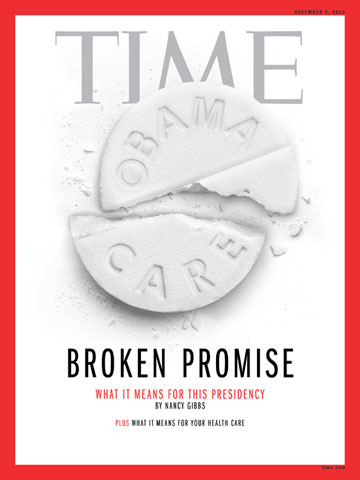
(3 of 6)
And this may be just the beginning of the damage control. Recent policy cancellations affected a tiny proportion of people compared with those who were reassured by another presidential promise: "If you like your doctor, you will be able to keep your doctor." Obama has dropped that from his script as insurers from Indiana to California cut the number of in-network doctors and hospitals in order to hold premiums down. He also once said the law wouldn't affect people who get coverage through their employers, but already some workers are losing their coverage or seeing their out-of-pocket expenses rise in the face of policy changes. "There is no doubt that Obamacare is going to cost more for small businesses," says David Hogberg, a senior fellow at the National Center for Public Policy Research. A recent poll by Public Opinion Strategies found that 28% of businesses with 40 to 500 employees plan to drop health care coverage by 2015 because of "sticker shock," Hogberg says. "When you start forcing insurers to cover various benefits, that's inevitably going to increase the costs."
In any given year, there is a huge amount of change and churn in the marketplace; individual policies have typically turned over 70% a year as people discovered just how skimpy they were. Many may find better or cheaper plans if they can eventually penetrate HealthCare.gov But the problem for the White House is that every change that people don't like will now be blamed on the law, even those that would have happened anyway. Meanwhile, those parts of the law that are working as planned or even better--kids staying on their parents' policies till they are 26, lower rehospitalization rates, the fact that vastly more people are getting insurance than losing it--get lost in the noise. Republicans are free to both denounce the policy and then decry how poorly it's working: "This dangerous assault on personal freedom doesn't even work!" goes the war cry that Republicans will repeat into the 2014 elections.
What Went Wrong?
As a candidate, Obama disdained the game of politics, a self-conscious contrast to all the tireless political athletes named Clinton. He would rise above the small government--vs.--Big Government debate by rolling out Smart Government, an E-Z Pass lane to the future. He ran more as magician than manager: "I'm not an operating officer," he said during the 2008 primaries. "Some in this debate around experience seem to think the job of the President is to go in and run some bureaucracy. Well, that's not my job. My job is to set a vision of 'Here's where the bureaucracy needs to go.'" To which Hillary Clinton responded, "I think it's important that we have a President who understands that you have to run the government."
